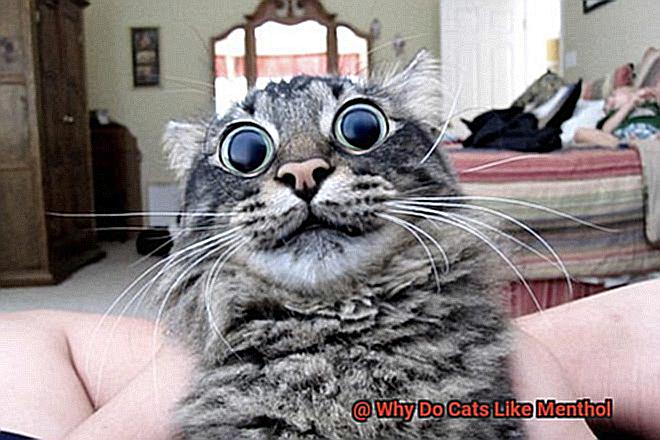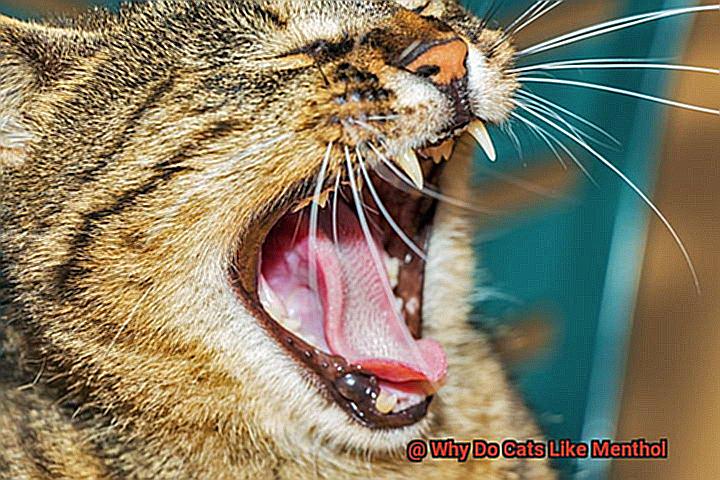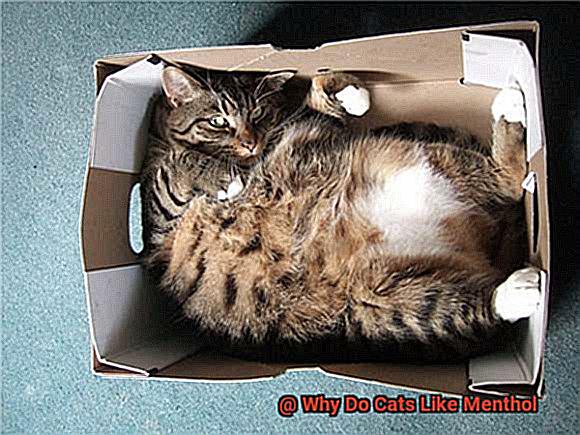Do you have a soft spot for precious felines? Have you ever been baffled by your furry friend’s unexplained affinity for menthol? It’s an intriguing and captivating subject that has left countless pet owners and experts utterly puzzled.
So, why do cats like menthol?
This incomprehensible behavior has a lot to do with a cat’s strong sense of smell.
Their olfactory system is superior to that of humans, allowing them to sense even the slightest of scents.
Because of their heightened sense of smell, cats are notoriously choosy when it comes to food and litter.
But why menthol, specifically? Research has revealed that menthol stimulates a cat’s olfactory glands, giving them a pleasurable sensation that many felines can’t resist.
It appears that this attraction to menthol is so powerful that it may even be used to ease the anxiety of nervous cats, according to some experts.
So, the next time you observe your cat rubbing their nose against something with a menthol aroma, you’ll understand that it’s not a coincidence.

Instead, it’s an intriguing aspect of their sensory abilities that makes them one-of-a-kind and captivating creatures.
Keep an eye out for more intriguing feline behavioral facts.
Olfactory System of Cats
Hey there, cat lovers. Let’s take a deep dive into the fascinating world of our feline friends’ sense of smell.
Did you know that cats have a superhuman sense of smell? Their olfactory system is truly amazing, making them one of the best-smelling creatures on earth.
So, how does it work? It all starts in the nose.
When a cat sniffs something, scent molecules get picked up by their two nostrils and then travel through the nasal passages to reach the olfactory bulb – a brain structure that analyzes and identifies the scents.
But wait, there’s more. Cats also have a specialized organ in their nose called the vomeronasal organ, also known as Jacobson’s organ.
It allows them to detect even more subtle scents or pheromones.
You might have seen your cat make a strange face by curling their lip and opening their mouth slightly.
This is called the Flehmen response, and it helps them analyze scents that are of particular interest to them.
Cats’ sense of smell is so powerful that they can even detect odors that are too faint or too subtle for our noses to pick up, which gives them a significant advantage in hunting and detecting predators.
However, not all smells are safe for our furry friends.
Cats may be drawn towards menthol-based products, like Vicks VapoRub, due to their cooling effect on their nasal passages and the minty smell that resembles catnip.
These products can harm our cats, leading to respiratory distress, seizures, and even death.
So, always keep them away from such products to ensure your cats’ well-being.

Understanding Menthol
Menthol is a compound extracted from peppermint plants with a long history of use in traditional medicine dating back to ancient Egypt, Greece, and Rome.
Back then, humans used it to treat a variety of ailments, including headache, nausea, and respiratory problems.
Its therapeutic benefits led menthol to become a popular ingredient in various consumer products we use today, such as candies, gum, topical analgesics, and cough and cold medicines.
Although menthol has been widely used in human medicine, it’s important to note that it can be toxic to cats and other animals.
Ingestion or inhalation of menthol can cause vomiting, tremors, and difficulty breathing in cats.
Therefore, pet owners must make sure to keep any menthol-containing products far from curious feline friends.
Even some pet products, such as sprays or balms, may contain menthol to help relieve pain or skin irritation in cats.
Reading the labels and keeping such products out of reach is a crucial step to ensuring your cat’s safety.
It’s interesting to note that menthol can also be found in cigarettes.
While some smokers enjoy menthol-flavored cigarettes, it’s essential to be aware of potential health risks involved.
The use of menthol in cigarettes has been controversial, with studies indicating that it could make smoking more addictive and harmful.
Though each individual should make their own decision, it’s crucial to consider the potential risks and consequences involved.
In conclusion, menthol has been around for centuries and is often used in various consumer products due to its cooling and soothing effects.
However, it can be harmful to cats and other animals, so we must exercise caution when using products containing menthol around pets.
How Cats Sense Menthol
Well, it turns out that cats have a unique affinity for menthol, which has a cooling and refreshing effect on their delicate nasal passageways.
Cats have an extraordinary sense of smell, with up to 200 million odor receptors in their noses compared to just five million in humans.
When cats inhale menthol, it triggers cold-sensitive receptors in their nasal mucosa, delivering a sensation of coolness that can be both stimulating and soothing.
Just like we enjoy the sensation of menthol in our toothpaste, cough drops, and topical treatments, our furry friends find it just as thrilling.
But why are cats so attracted to menthol in the first place? The answer may lie in their evolutionary history.
As natural-born predators, cats rely heavily on their sense of smell to locate prey.
Menthol-containing plants, such as catnip and valerian, have a sedative effect on cats and may have been used by their ancestors to aid in the hunting process by helping them be more stealthy and undetected.
While menthol is generally safe for cats to inhale in small amounts, it is essential to be cautious with high concentrations of menthol found in some human products such as Vicks.
These can be toxic to cats and potentially cause severe health problems.
Dangers of Menthol for Cats
Here, let’s take a closer look at the potential risks of menthol for our beloved felines.
Menthol, commonly used in human products such as cough drops, throat lozenges and balms for muscle pain, contains compounds toxic to cats.
When inhaled, menthol can cause respiratory distress, resulting in coughing, gagging, and difficulty breathing.
For cats with pre-existing respiratory disorders, this can exacerbate their symptoms and even lead to life-threatening problems.
Additionally, ingesting menthol can cause liver and kidney damage in cats, which may eventually result in severe health complications.
Hypersensitivity to the ingredient can also cause adverse reactions in cats, such as skin irritation or vomiting.
A popular product that contains menthol is Vicks, a vapor rub that includes eucalyptus, which can be just as harmful to cats as menthol.
If a cat inhales Vicks, it can result in severe respiratory distress, and in some cases, pneumonia.
So, how can we keep our cats safe from menthol? The first step is to avoid using any menthol-containing drugs, especially those meant for humans.
We should also store all menthol-containing products out of our cat’s reach, including Vicks vapor rub.
Furthermore, if you observe any unusual symptoms in your cat after exposure to menthol or any other potentially harmful ingredient, consult your veterinarian immediately.
We should all prioritize our cat’s health and wellbeing by being proactive in keeping them safe from harm.
Remember, it’s better to be safe than sorry.
By taking simple precautions and being aware of the potential risks of menthol, we can ensure our furry companions live happy and healthy lives.
Risks of Using Vick’s VapoRub
We offer the risks associated with using Vick’s VapoRub on cats.
This popular human decongestant contains active ingredients like menthol, camphor, and eucalyptus oil, which can be incredibly harmful to our furry friends.
Menthol, a key component of Vick’s VapoRub, can lead to respiratory difficulties and even distress if cats inhale it.
It can cause irritation of the mucous membranes in their throats, leading to coughing and gagging.
Furthermore, if a cat happens to ingest VapoRub or similar products containing menthol, they may experience vomiting, diarrhea, or abdominal pain, which can be dangerous for their overall health.
In addition to menthol, camphor and eucalyptus oil are hazardous to cats.
Camphor could cause seizures, breathing difficulties, and liver damage in our feline friends, while Eucalyptus oil may cause gastrointestinal distress and nervous system depression.
It’s essential to take precautions to ensure that our cats aren’t accidentally exposed to any harmful substances, including menthol, camphor, or eucalyptus oil.
Always store these types of products in locations that are out of reach of our feline friends.
If you suspect that your cat has ingested or inhaled any of these substances, seek immediate veterinary attention.
Pet owners should be mindful of the signs of toxicity, such as vomiting, breathing difficulty, seizures, or abdominal pain.
In conclusion, while Vick’s VapoRub might ease congestion and coughs in humans, it’s not safe for cats.
The ingredients in the rub can cause serious health issues if ingested or inhaled.
If you accidentally expose your feline friend to any of these substances, seek veterinary assistance right away.
Toleration Levels of Cats
Greetings, cat lovers. As a cat health expert, I am passionate about educating others on how to keep their furry friends healthy and happy.
One topic that often springs up is how cats’ toleration levels differ from humans when it comes to various substances.
Let’s dive into the unique physiology of cats.
Firstly, cats possess an excellent sense of smell.
Their nasal cavity is specifically designed to detect even the slightest changes in their environment.
This heightened sense of smell can make them more susceptible to certain smells compared to humans, such as menthol.
Although a cat might appear to like the scent of menthol, it doesn’t mean that it’s safe for them to consume or inhale, especially in large quantities.
It is crucial to exercise caution, particularly with products containing menthol, camphor, eucalyptus oil, or mint, which may cause respiratory distress or toxicity in cats.
Ensure that these products are kept out of reach and monitored closely during usage.
It’s also essential to understand that every cat’s toleration level is different.
While some cats may show no response, others may manifest severe symptoms such as vomiting, diarrhea, and respiratory difficulties.
Addiction Patterns
Cats are known for their unique sense of smell, which is much more sensitive than humans.
This unmatched olfactory ability can translate into a pleasurable experience when cats are exposed to menthol.
Menthol is a chemical compound commonly found in various mentholated products, such as cough drops, muscle pain relievers, and oral hygiene products.
The idea that cats can become addicted to the scent of menthol is not a myth.
These feline friends can not only detect menthol easily, but some can also become dependent on it.
If this addiction goes unchecked, it can lead to harmful effects on the cat’s health.
In some cats, menthol can have stimulating and soothing effects when inhaled.
Some cats will keep sniffing around to get a whiff of the delectable menthol scent.
Sadly, not all cats respond positively to the scent of menthol.
In some cases, the aroma can be irritating, causing adverse reactions like sneezing, coughing, or respiratory distress.
So, it is crucial to monitor your cat’s behavior and reactions to mentholated products and seek veterinary advice if necessary.
Additionally, it is important to realize that exposure to menthol can lead to a developing menthol addiction in some cats.

Cats, like humans, can become addicted to the pleasurable sensations triggered by consuming or inhaling certain substances, including menthol.
If a cat repeatedly seeks out and consumes mentholated products, this could be a warning sign of addiction.
Thus, while some cats may love the scent of menthol, it’s essential to ensure the safety and well-being of our furry companions.
Mentholated items should always be kept out of their reach.
Some cats may react positively to the smell, and others may not like it at all.
As such, pet owners should always monitor their pet’s behavior and reactions and seek veterinary advice if necessary.
Alternatives for Cats
First and foremost, let’s talk about essential oils. While they can provide similar benefits to menthol, it’s essential to do your research and find out which oils are safe for your cat.
Some essential oils, such as tea tree and peppermint, can be harmful to cats, so make sure you use the right ones.
Some of the essential oils that are safe for cats include lavender, chamomile, and valerian root.
You can use them in a diffuser, humidifier, or dilute them and apply them to your cat’s bedding for a relaxing and calming effect.
Another great alternative is herbal remedies, and catnip is a fantastic option.
Not only will it provide your cat with a natural, calming effect, but it’s also entirely safe for them.
Eucalyptus oil can be used in moderation, but it should be avoided on your cat’s skin or fur.
Instead, you can add it to a diffuser or place it near your cat’s bedding for a pleasant and soothing scent.
If your cat is struggling with respiratory issues or congestion, steam therapy can provide relief.
Create a steamy environment by running a hot shower for several minutes and bring your cat into the bathroom for a short period, ensuring they don’t get too close to the water or steam.
The steam can help clear your cat’s airways and make them feel much better.
So, choosing the right alternative product is crucial when it comes to keeping your cat safe and healthy.
By using natural options such as essential oils, herbal remedies, and steam therapy, you can give your cat a relaxing and calming experience without any harmful side effects.
Conclusion
In conclusion, it is important to keep in mind that cats have a unique sense of smell that is essential to their well-being.
Although cats may enjoy the refreshing scent of menthol, it’s crucial to note that mentholated products such as Vicks VapoRub can be harmful to their respiratory system.
As responsible pet owners, it’s our duty to prioritize the safety and health of our cats by keeping such products out of reach.
Additionally, it’s crucial to pay attention to your cat’s reactions to new substances since they have different tolerance levels than humans.
In the event that your cat comes into contact with a harmful substance, immediate veterinary care is necessary.
However, there are safe alternatives such as herbal remedies and essential oils that can provide relief.
Catnip, for example, is a popular choice to soothe and calm cats.
Essential oils such as lavender, chamomile, and valerian root can be safely used in diffusers, humidifiers, or diluted and applied to your cat’s bedding.
Steam therapy is another useful option that can assist in clearing your cat’s airways and helping them feel comfortable.
By selecting the right alternative products and practicing responsible pet care, you can ensure that your feline friend lives the happiest and healthiest life possible.







